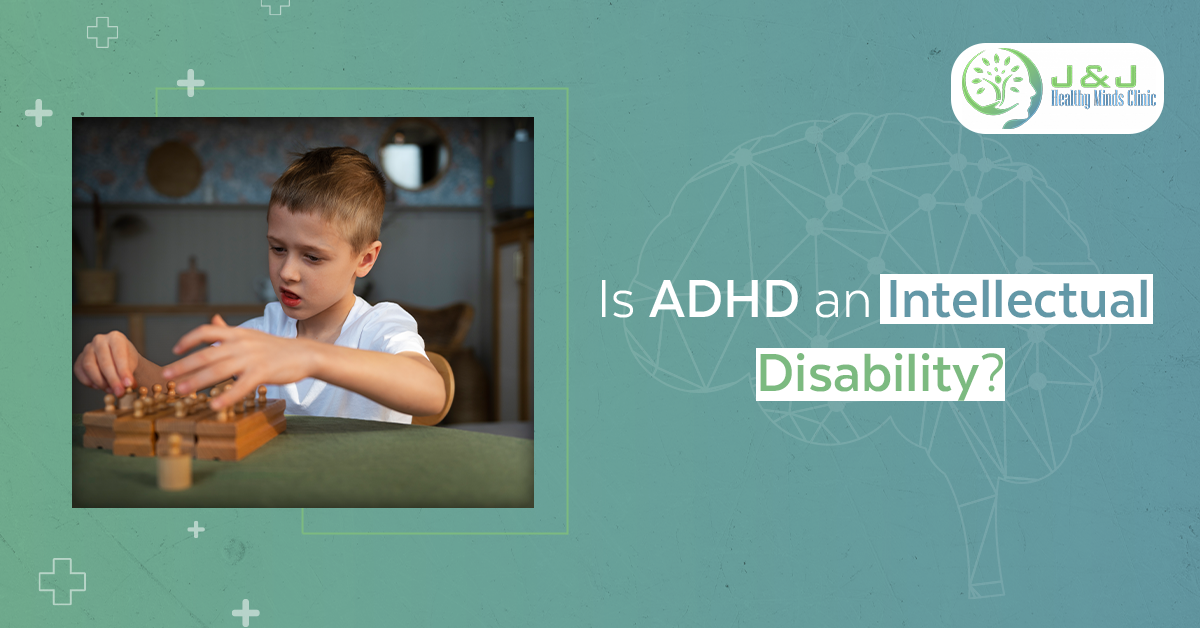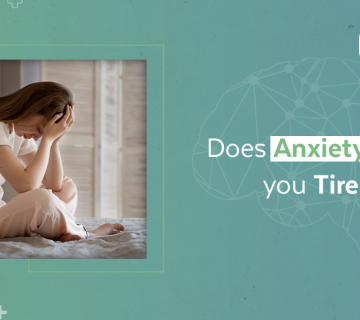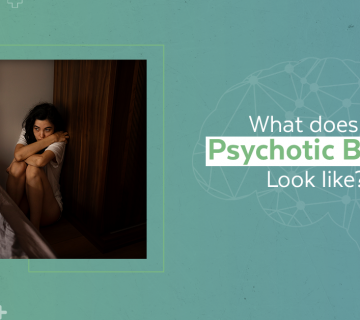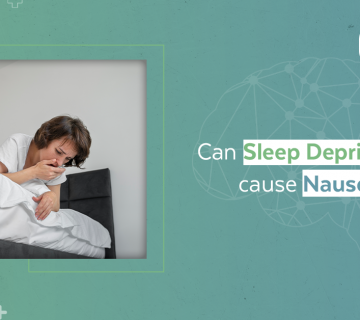Attention Deficit Hyperactivity Disorder (ADHD) impacts behavior and comprehension just like intellectual differences. They both have effects, yet, they are not the same thing.
“Is ADHD an intellectual disability?” Some might pose this question, but ADHD and intellectual differences are separate in their influence on a person’s skills and daily activities.
ADHD affects about 7.6% of children under 12 years old around the world. In adults, the rate is between 2.5% and 2.58%. On the other hand, 1–3% of people have an intellectual disability. These conditions affect millions of people, bringing both challenges and chances to grow.
Below, we will explain the main differences and answer the question, “Is ADHD an intellectual disability?”
At J & J Healthy Minds Clinic, we value each mind’s uniqueness. First, we assess your health and family history. Then, using advanced methods, we identify mental disorders like bipolar disorder and ADHD.
We also examine the links between physical health, thoughts, and social connections. For more details, please reach out!
What Is ADHD?
ADHD is a brain based condition. It causes focus challenges, hyperactivity, and impulsiveness. People with ADHD usually find it hard to concentrate, follow directions, or control their energy. There are mainly three forms of ADHD:
- Inattentive Type: People find it hard to focus on details, complete tasks, or plan activities.
- Over Active Impulse Type: This version includes too much fidgeting, trouble staying still, and impulse actions.
- Combined Type: Both non focused and over active impulsive symptoms are combined.
ADHD may affect day-to-day life, but it doesn’t mean a person is less smart. In truth, people with ADHD usually have regular or superior intelligence. But their symptoms can sometimes obstruct their ability to show their capabilities consistently.
Is ADHD an Intellectual Disability?
No, ADHD isn’t labeled as an intellectual disability. ADHD and mental disabilities may seem linked. Both affect behavior and learning. But, they’re not the same.
ADHD and mental disabilities can overlap, which is curious. Both involve problems with thinking and behavior, but they are distinct.
ADHD causes issues with attention, focus, and impulse control. Intellectual disabilities limit intellectual function and adaptability.
Intellectual Disabilities Explained
Intellectual disability is marked by challenges in brain performance and daily-life change. Those affected often score lower on IQ tests. They struggle with tasks like managing money, communicating clearly, and self-care.
Intellectual disability characteristics involve issues with:
- Solving problems
- Weak memory
- Understanding complex ideas
Not alike, individuals with ADHD usually show a normal IQ range. They might even outperform in inventing or problem-solving. This is despite setbacks in organizing their thoughts and maintaining focus.
Signs of Intellectual Disability
Signs of intellectual disability usually show up in early childhood. But, they may stand out more in adulthood. These signs could be:
- Not reaching growth markers on time.
- Struggle with simple educational skills.
- Issues dealing with people and expressing themselves.
- Limitations in doing everyday chores on their own.
Other characteristics of profound intellectual disability may include:
- Inability to speak or communicate well
- Major motor delays
- Reliance on others for daily care.
In contrast, mild mental disability symptoms may cause slower academic progress. But, it allows learning practical skills with guidance.
What Causes Intellectual Disability?
Intellectual impairment can come from several causes, including:
- Genetic conditions, like Down syndrome.
- Pregnancy issues, such as drug use or poor nutrition.
- Complications at birth.
- Infections before or after birth.
- Environmental factors, like lack of early learning or care.
What IQ Is Considered Disabled?
Intellectual disability is defined by an IQ of less than 70. However, diagnosis also considers adaptive skills like self-care and communication. Meanwhile, ADHD is not linked to IQ. People with high IQs can still face focus and organization issues due to ADHD. This shows the complexity of assessing cognitive abilities.
Signs of Low IQ in Children
Low IQ symptoms in children usually show slow progress in language, motor skills, and Buddying up. Parents should look out for these red flags:
- Trouble following directions.
- Problems making friends.
- Lagging behind in learning self-care routines.
Legal Rights of People with Intellectual Disabilities
People with intellectual challenges can legally get education, jobs, and healthcare thanks to laws like the Americans with Disabilities Act (ADA) and the Individuals with Disabilities Education Act (IDEA). They’re also due right accommodations and help.
Treating ADHD Vs Intellectual Disabilities
-
ADHD Treatment
Treating ADHD often involves:
- Behavioral therapy to manage impulsivity and improve focus.
- Medications like stimulants to enhance attention.
- Time management strategies to build organization skills.
-
Intellectual Disability Treatments
There is no treatment for intellectual challenges. Yet, therapies can support. They can help individuals lead fulfilling lives. Common intellectual disability therapies include:
- Speech therapy for communication challenges.
- Occupational therapy for advancing self-sustenance skills.
- Individualized educational plans suited to specific demands.
Can Intellectual Disabilities Be Cured?
Presently, there is no cure for intellectual disabilities. The main goal of treatment is to help people. They should learn skills and coping methods to improve their daily lives.
It’s crucial to have help for those with intellectual disabilities. It must come from healthcare workers, teachers, and family.
Conclusion
So, is ADHD an intellectual disability? The answer is clear no, ADHD is not an intellectual disability. ADHD and intellectual disabilities share focus issues but are different.
ADHD affects attention and behavior. In contrast, intellectual disabilities impact thinking and daily skills. Each condition needs its own support approach.
Knowing the differences helps in getting the right help. This is vital for those with one or both conditions. Understanding these disorders enables better care and interventions.
FAQs
What does IDD stand for?
Intellectual and Developmental Disabilities (IDD) include cognitive impairments and autism. IDD impacts learning, reasoning, and daily skills for life.
What are the signs of intellectual disability in adults?
Mature persons with mental health issues frequently wrestle with independence. They find it hard to make friends, get jobs, and manage money. Their mental and social skills may be limited, so they need help with daily tasks.
What are low intelligence symptoms?
Symptoms of low intelligence may include slow learning, trouble with memory, limited ability to solve problems or reason abstractly, and challenges with communication or social skills.






No comment